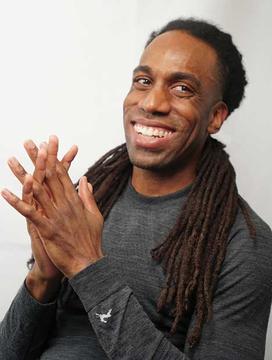Russell Dinkins ’13 Is Fighting for Collegiate Track and Field
When schools cut the sport, they also eliminate academic opportunities for Black students

Being recruited for a college sports team can be an admission ticket to a school that might otherwise be out of reach. But the same racial groups that are typically underrepresented in college enrollments also tend to be underrepresented on many of the athletic teams that colleges and universities offer.
Admissions slots for some sports, such as lacrosse or baseball, are much less likely than track and field to be filled by Black students, notes Russell Dinkins ’13, who competed in the 400-meter and 800-meter races for Princeton’s track and field team. According to the NCAA, in 2020, 3 percent of Division I male lacrosse student-athletes and 6 percent of Division I baseball student-athletes identified as Black, compared to 26 percent of Division I male outdoor track student-athletes.
Over the past two years, Dinkins, 32, has become a leading voice in the fight to stop colleges and universities from eliminating their track and field programs. “I’m not saying that those [other] sports need to be taken away,” Dinkins says. “I’m just saying the one sport that actually offers these opportunities to a wider swath of people — opportunities that are more likely to benefit Black athletes — shouldn’t be taken away.”
In June 2020, after hearing that Brown University was planning to cut men’s track and field as a varsity sport, Dinkins posted an opinion piece on Medium that used admissions and athletics data to demonstrate how cutting the sport would pose a stark contrast to the support for racial justice that the university announced in the weeks after George Floyd’s murder in Minneapolis. The post went viral, and within weeks — after being further lobbied by Brown alumni and students equipped with Dinkins’ research and support — Brown President Christina H. Paxson announced that its men’s track and field program would be reinstated, noting that “these sports have been a point of entry to higher education for academically talented students who otherwise would not have had the opportunity, many of them students of color.”
Since then, Dinkins has offered his insights and support to students and alumni battling to preserve track programs at the University of Minnesota, Clemson University, and the College of William and Mary. While college sports may seem like big business, balancing athletic-department budgets is a challenge for most colleges. Football and men’s basketball are typically the only teams that generate any revenue, leaving universities to cover the costs for all of their other teams. And because of COVID-19, many schools have seen tuition revenue decline. According to the sports news website Business of College Sports, eight NCAA Division I programs in cross country, indoor track and field, and outdoor track and field have been cut during the pandemic. (Princeton has said that it has no plans to eliminate any varsity teams.)
Athletic decisions are also governed by Title IX, the landmark 1972 federal law that effectively requires colleges to ensure they are providing equal opportunities — including athletic opportunities — to students regardless of sex.
When forced to make tough decisions about balancing their budgets or ensuring their Title IX compliance, some colleges target track and field for elimination, despite data that suggests that track is a benefit to the college on both counts, says Dinkins, who worked at Mathematica Policy Research before he was laid off during the pandemic.
But his foremost concern is preserving the opportunity track and field provides for students of color and those from lower-income backgrounds to pursue college degrees. “When we’re looking at opportunities, particularly opportunities for Black men, to access education, we should be looking at expanding all those potential opportunities and pathways, including sport, not taking them away,” he says.
Dinkins estimates that his efforts, supported in part by a stipend he garnered from the running-apparel company Tracksmith, have so far helped to save at least 200 student-athlete spots from elimination. He is currently in discussions with student and alumni supporters of at least one more college about advocating for its track and field program.











No responses yet